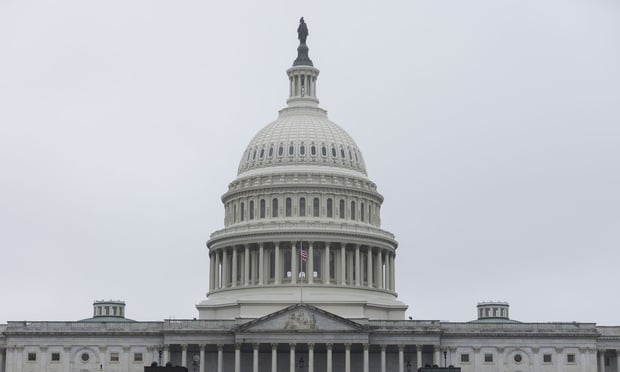 U.S. Capitol building in Washington. Photo: Diego M. Radzinschi/ALM
U.S. Capitol building in Washington. Photo: Diego M. Radzinschi/ALM
Members of the House Education and Workforce Committee have approved two bills that could help small employers copy big employers' health benefits strategies.
The committee voted 21-15 to recommend the Association Health Plan Act bill and 21-15 to recommend the Self-Insurance Protection Act bill.
Recommended For You
All 21 Republicans on the committee voted for the bills, and all but one of the Democrats voted against the bills. One Democrat did not vote.
The AHP bill would make it easier for small employers, self-employed people and others to join together to buy health coverage.
The self-insured plan bill would help small employers offer self-insured health plans and use stop-loss insurance plans to limit their risk, by preempting state efforts to regulate stop-loss plans sold to self-insured health plans as health insurance. The bill would block state efforts to define stop-loss arrangements covering very small employers as health insurance.
Rep. Tim Walberg, R-Mich., the committee chairman, sponsored the AHP bill, and he said during the bill "markup," or voting session, that the bill would help small employers band together to get access to the same regulatory and economic benefits as large group plans.
"Because they have fewer employees, small businesses have limited bargaining power," Walberg said.
Related: Association health plan bill returns to House, with more mojo this time
Rep. Robert Onder, R-Mo, the sponsor of the stop-loss bill, said implementing it would stop New York and some other states from shutting small employers out of the self-insurance market.
The bill "prevents bureaucratic overreach and clarifies that once and for all that small businesses have just as much of a right to self-insure as large businesses," Onder said.
Rep. Robert Scott, D-Va., said the bills are examples of Republican efforts to undermine the Affordable Care Act.
AHP legislation supporters have argued that AHP programs let the sponsors offer better benefits and that the current provisions would keep the AHPs from shutting out people with health problems.
Scott said he believes that the AHP bill would lower premiums for some by helping participants avoid complying with the Affordable Care Act benefits rules that apply to individual coverage and small group plans.
The AHPs would hold down premiums by "skimping on benefits and increasing costs for others," Scott said. "Association plans enroll young, healthy people to form a separate pool that charges lower premiums."
An AHP "leaves everybody else behind to pay average higher premiums while the privileged few get to sneak out the back door and play pay less," Scott added.
If too many people in an AHP group get sick, "the AHP can collapse," Scott said. "That group just rejoins the ACA marketplace, which in effect has provided backup care coverage for those paying lower rates. That's unfair to everyone who had been paying higher premiums all along."
Scott also opposed the self-insurance bill.
"When subject to appropriate guard rails, stop-loss plans can mitigate risk for self-insured group plans," Scott said. "However, stop-loss plans are now increasingly designed to mimic health insurance while not adhering to rules that apply to everybody else. I oppose the bill because it would make it virtually impossible for both states and the federal government to protect the consumers who will end up in these plans."
The future: The House Education and the Workforce has sole jurisdiction over the bills.
The bills could go to the House floor as stand-alone bills and get consideration under "regular order."
They could also get bundled into the One Big Beautiful Bill Act tax package or another big "must pass" package.
© Touchpoint Markets, All Rights Reserved. Request academic re-use from www.copyright.com. All other uses, submit a request to [email protected]. For more inforrmation visit Asset & Logo Licensing.






